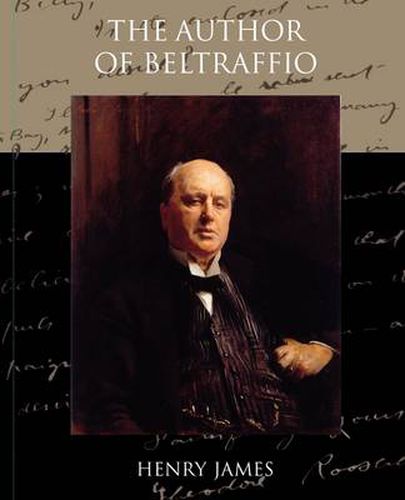Readings Newsletter
Become a Readings Member to make your shopping experience even easier.
Sign in or sign up for free!
You’re not far away from qualifying for FREE standard shipping within Australia
You’ve qualified for FREE standard shipping within Australia
The cart is loading…






This title is printed to order. This book may have been self-published. If so, we cannot guarantee the quality of the content. In the main most books will have gone through the editing process however some may not. We therefore suggest that you be aware of this before ordering this book. If in doubt check either the author or publisher’s details as we are unable to accept any returns unless they are faulty. Please contact us if you have any questions.
Henry James (1843 - 1916) was one of the leaders in the school of realism in fiction. He is known for his series of novels in which he portrayed the encounter of America with Europe. James is considered to be the master of the novel and novella. James wrote about personal relationships and the power within these relationships. James explored consciousness and perception from the point of view of a character within a tale. The Author of Beltraffio tells of a man who has written a novel. He has a rigid Calvinistic wife who despises his work. She hopes to keep his son away form the evil in his works. The story begins, Much as I wished to see him I had kept my letter of introduction three weeks in my pocket-book. I was nervous and timid about meeting him–conscious of youth and ignorance, convinced that he was tormented by strangers, and especially by my country-people, and not exempt from the suspicion that he had the irritability as well as the dignity of genius. Moreover, the pleasure, if it should occur-for I could scarcely believe it was near at hand–would be so great that I wished to think of it in advance, to feel it there against my breast, not to mix it with satisfactions more superficial and usual. In the little game of new sensations that I was playing with my ingenuous mind I wished to keep my visit to the author of Beltraffio as a trump-card.
$9.00 standard shipping within Australia
FREE standard shipping within Australia for orders over $100.00
Express & International shipping calculated at checkout
This title is printed to order. This book may have been self-published. If so, we cannot guarantee the quality of the content. In the main most books will have gone through the editing process however some may not. We therefore suggest that you be aware of this before ordering this book. If in doubt check either the author or publisher’s details as we are unable to accept any returns unless they are faulty. Please contact us if you have any questions.
Henry James (1843 - 1916) was one of the leaders in the school of realism in fiction. He is known for his series of novels in which he portrayed the encounter of America with Europe. James is considered to be the master of the novel and novella. James wrote about personal relationships and the power within these relationships. James explored consciousness and perception from the point of view of a character within a tale. The Author of Beltraffio tells of a man who has written a novel. He has a rigid Calvinistic wife who despises his work. She hopes to keep his son away form the evil in his works. The story begins, Much as I wished to see him I had kept my letter of introduction three weeks in my pocket-book. I was nervous and timid about meeting him–conscious of youth and ignorance, convinced that he was tormented by strangers, and especially by my country-people, and not exempt from the suspicion that he had the irritability as well as the dignity of genius. Moreover, the pleasure, if it should occur-for I could scarcely believe it was near at hand–would be so great that I wished to think of it in advance, to feel it there against my breast, not to mix it with satisfactions more superficial and usual. In the little game of new sensations that I was playing with my ingenuous mind I wished to keep my visit to the author of Beltraffio as a trump-card.